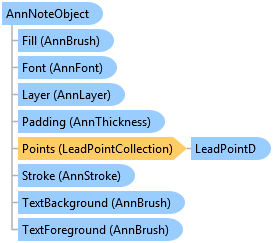| Leadtools.Annotations.Core Namespace : AnnNoteObject Class |

public class AnnNoteObject : AnnTextObject, IAnnObjectCloneable
Public Class AnnNoteObject Inherits AnnTextObject Implements IAnnObjectCloneable
public sealed class AnnNoteObject : IAnnObjectCloneable
@interface LTAnnNoteObject : LTAnnTextObject<NSCoding,NSCopying>
public class AnnNoteObject extends AnnTextObject
function Leadtools.Annotations.Core.AnnNoteObject()
The AnnNoteObject is a rectangle with a shadow border and brush background (yellow by default). It contains a text string with font properties. The text will wrap on word breaks within the object's specified rectangle.
With the automated functions, the user clicks or taps and drags to specify the rectangle in the current window. A dialog box then lets the user enter the text.
Programmatically, the boundaries and location of the note object can be controlled using the following properties:
Each object can be transformed with the following methods:
The AnnNoteObject class inherits a number of properties from the AnnObject class, providing support for font, stroke and fill characteristics. These properties are listed below:
The AnnNoteObject inherits a number of text properties from the AnnTextObject class that provide support for text alignment, margins, etc. These properties are listed below:
The name of the note object can be controlled using AnnObject.Labels property, inherited from the AnnObject class.
An object can be part of a group annotation object or part of a container object. It cannot be part of both a group and a container at the same time.
The following properties can also be used to programmatically set characteristics of an AnnNoteObject:
 Copy Code
Copy Code
using Leadtools.Annotations.Automation; using Leadtools.Annotations.Core; using Leadtools.Codecs; using Leadtools.WinForms; public void AnnCore_AnnNoteObject() { // assumes _automation is valid double inch = 720.0; // Add a note object AnnNoteObject noteObj = new AnnNoteObject(); // Set the points for the note noteObj.Points.Add(LeadPointD.Create(1 * inch, 1 * inch)); noteObj.Points.Add(LeadPointD.Create(3 * inch, 1 * inch)); noteObj.Points.Add(LeadPointD.Create(3 * inch, 3 * inch)); noteObj.Points.Add(LeadPointD.Create(1 * inch, 3 * inch)); // Set the text noteObj.Text = "this is text for a note object"; // Add the object to the automation container _automation.Container.Children.Add(noteObj); // Select the object _automation.SelectObject(noteObj); }
using Leadtools.Converters; using Leadtools.Annotations.Automation; using Leadtools.Controls; using Leadtools.Annotations.Core; using Leadtools.Codecs; [TestMethod] public void AnnCore_AnnNoteObject() { // assumes _automation is valid double inch = 720.0; // Add a note object AnnNoteObject noteObj = new AnnNoteObject(); // Set the points for the note noteObj.Points.Add(LeadPointDHelper.Create(1 * inch, 1 * inch)); noteObj.Points.Add(LeadPointDHelper.Create(3 * inch, 1 * inch)); noteObj.Points.Add(LeadPointDHelper.Create(3 * inch, 3 * inch)); noteObj.Points.Add(LeadPointDHelper.Create(1 * inch, 3 * inch)); // Set the text noteObj.Text = "this is text for a note object"; // Add the object to the automation container _automation.Container.Children.Add(noteObj); // Select the object _automation.SelectObject(noteObj); }